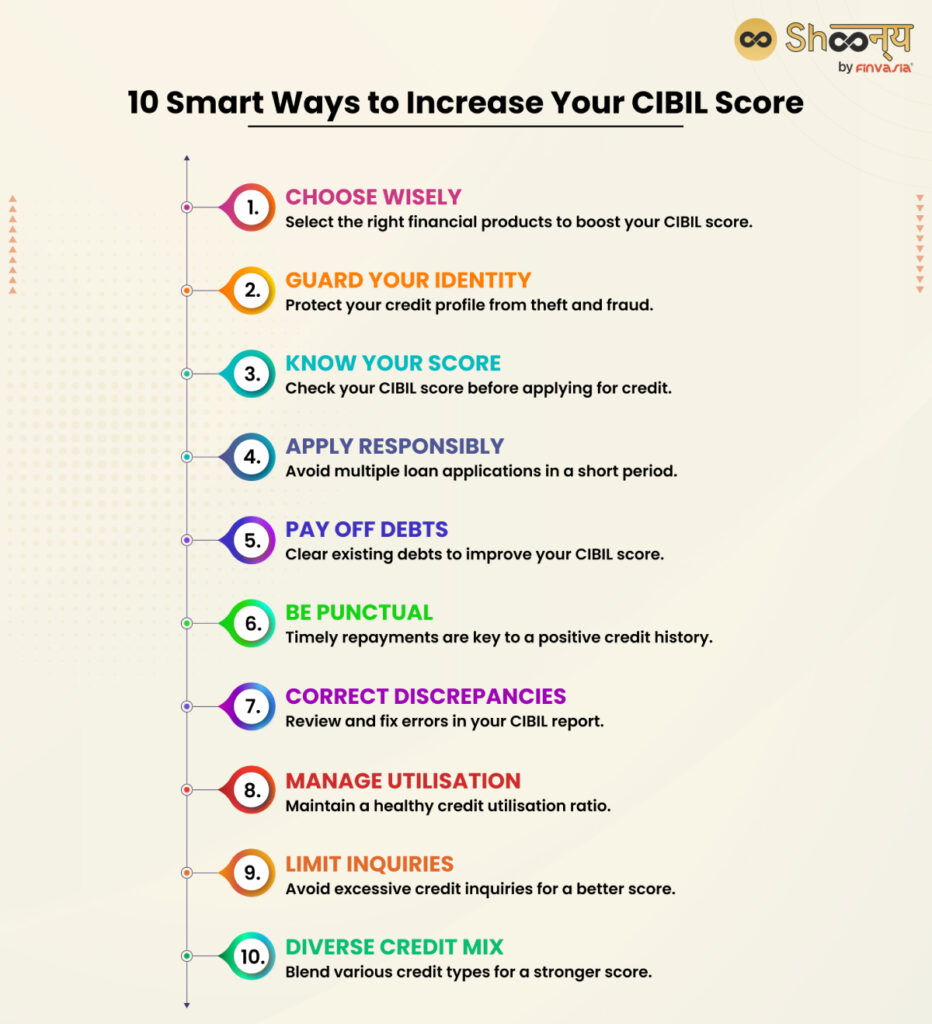Your CIBIL score is more than just a number; it’s a key that can unlock financial opportunities or close doors to credit and loans. If you’re in India, you’ve probably heard about the importance of a good CIBIL score. But what exactly is it, and why does it matter?
What is a CIBIL Score?
Your Credit Information Bureau (India) Limited (CIBIL) score, commonly called a CIBIL score, is a three-digit numerical representation of your creditworthiness. It measures how likely you are to repay borrowed money and honour your credit commitments. In India, CIBIL is one of the leading credit bureaus that track and maintain credit records of individuals and businesses.
How is the Credit Score Calculated?
Your credit score reflects your creditworthiness, shaped by your past and present financial behaviour. Credit bureaus employ varying methods, yet these key factors are typically considered:
- Payment History: The most influential factor. It gauges your consistency in repaying loans and credit cards on time. Any late payments, defaults, settlements, or write-offs can lower your score.
- Credit Utilization Ratio: This ratio reveals how much credit you use compared to your limit. A high ratio suggests financial strain, while a lower one showcases responsible credit use. Keeping it under 30% is advisable.
- Credit History Length: The average age of your credit accounts, both open and closed, reflects your experience with credit. A longer history often improves your score, signifying reliability.
- New Credit: The frequency of opening or applying for new credit accounts. Too many applications in a short span can lower your score, while occasional new credit can diversify your portfolio.
- Credit Mix: The variety of credit types you manage, including secured loans, unsecured loans, and revolving credit. A well-balanced mix showcases your adaptability as a borrower.
Credit bureaus assign different weights to these factors to calculate your score, typically ranging from 300 to 900. A higher credit score means a greater chance of timely and full debt repayment, making you more appealing to lenders.
How to Improve CIBIL Score Quickly- Exploring the 10 Proven Strategies
1. Selecting the Right Financial Products with Examples
India’s financial ecosystem has evolved, offering many credit options to meet diverse needs. With the advent of fintech, pre-approved loans, instant credit at the point of sale, salary advances, and more are within easy reach. For instance, consider the scenario of someone needing immediate funds for a medical emergency. Leveraging data analytics, financial institutions now identify potential customers for pre-approved medical loans, enabling borrowers to access credit easily.
By carefully selecting suitable loans and ensuring timely repayments, you not only meet your financial goals but also enhance your credit score, unlocking better financial opportunities.
2. Protecting Your Credit Profile from Identity Theft and Fraud
Your credit profile is your financial identity. Protecting it from identity theft and fraud is crucial. These threats not only harm your credit score but also jeopardise your overall creditworthiness. Lenders view a low credit score as a red flag, reducing your chances of loan approval. For example, imagine someone’s identity is stolen, and unauthorised credit card transactions occur. This not only negatively affects their credit score but also leaves them with the burden of proving their innocence.
Regularly reviewing your credit reports and promptly addressing discrepancies is vital. Safeguard your credit history, and it will safeguard your financial future.
3. Preparation Before Applying for New Credit
Before applying for new credit, always check your credit score. Your score influences your loan terms – higher scores lead to better rates and more options. For example, when buying your first car, a good credit score can secure a lower interest rate on your auto loan.
You must check your CIBIL score before applying for any credit facility.
4. Responsible Credit Application Practices
Avoid the temptation of applying for multiple loans in a short time frame. Such actions may raise concerns among lenders about over-reliance on credit, potentially impacting your credit profile.
Carefully evaluate your needs and refrain from hasty loan applications, maintaining a favorable credit position.
5. Clearing Existing Debt for a Better CIBIL Score
One of the most effective ways to improve your CIBIL score is by clearing your existing debt. Outstanding balances on loans and credit cards can negatively impact your score. Focus on paying off these debts on time to demonstrate responsible financial behavior.
For instance, consider someone with multiple credit card debts. Clearing these debts can significantly boost their credit score.
6. Timely Repayments for a Positive Credit History
Paying your EMIs and credit card bills on time is highly important for maintaining a good credit score. Delays or missed payments can lead to a lower credit score, making it harder to secure credit in the future.
You must set up reminders or automatic payments to ensure timely repayments.
7. Checking and Correcting Errors in Your CIBIL Report
Errors in your CIBIL report can unfairly drag down your credit score. Regularly review your credit report for inaccuracies and dispute any errors you find. Correcting these mistakes can lead to an immediate boost in your credit score.
For example, consider a situation where a loan that was paid off is still marked as outstanding on your report. Correcting this error can significantly improve your credit score.
8. Managing Your Credit Utilization Ratio
Your credit utilisation ratio is referred to as the amount of credit you use compared to your total available credit. Aim to keep this ratio below 30% to maintain a healthy credit score.
High credit utilization can signal financial strain to lenders, potentially impacting your creditworthiness.
9. Avoiding Multiple Credit Inquiries
Whenever you request credit, it triggers a hard inquiry on your credit report. Excessive inquiries within a short time frame can negatively impact your credit score.
It’s wise to conduct thorough research and select credit options thoughtfully, refraining from making unnecessary credit applications.
10. The Importance of a Diverse Credit Mix
Having a blend of various credit types, such as credit cards and instalment loans, can positively impact your credit score. When your credit score is good, lenders will not have reasons to delay your process. They often prefer borrowers with a history of responsible credit management across different credit products. For instance, imagine someone who has a history of managing both credit cards and a car loan responsibly. This diversity in their credit mix demonstrates their ability to handle various financial obligations.

Building a secure financial future requires careful planning and continuous commitment, akin to maintaining a good CIBIL score. By adhering to these principles and considering the factors highlighted, you’ll establish a robust financial foundation.
What Happens When Credit Score Goes Down
Your credit score can fluctuate due to factors like your payment history, credit utilisation, credit diversity, recent credit applications, and the accuracy of your credit report. In case your credit score is good, it can lead to more favourable loan terms, while a lower score can limit your access to credit and result in higher borrowing costs.
When your credit score declines in India, it usually indicates unfavourable changes in your credit profile. Common reasons include:
- Missing or making late payments on loans or credit cards can greatly impact your credit score. Remember that the payment history is a crucial factor in credit scoring in India.
- High credit utilisation, indicating excessive debt relative to your credit limits. Keeping a low credit utilisation ratio is essential for a healthy credit score in India.
- Multiple credit inquiries or new credit applications in a short period of time can signal financial instability to lenders.
- Errors or fraudulent information on your credit report should be promptly updated to prevent negative effects on your credit score, as per Indian credit reporting agencies like CIBIL.
Why is Your CIBIL Score Important?
Your CIBIL score plays a key role in your financial life, and here’s why:
- Loan Approvals: Lenders, including banks and financial institutions, rely on your CIBIL score to assess the risk of lending you money. A higher score raises your chances of loan approval.
- Interest Rates: A good CIBIL score often translates to lower interest rates on loans and credit cards. This lets you to borrow money at a more affordable cost.
- Credit Card Approvals: Credit card companies use your credit score to estimate whether to issue you a credit card and what credit limit to offer.
- Financial Opportunities: A strong CIBIL score opens doors to better financial opportunities, including premium credit cards, higher loan amounts, and favourable terms on financial products.
By following these guidelines and making informed financial decisions, you’ll be well on your way to achieving a higher CIBIL score and securing your financial future.
FAQs on How to Increase Your CIBIL Score
A good CIBIL score typically falls in the range of 700 and above. Lenders consider this score favourable for loan approvals.
Regularly monitoring your credit report is essential. Aim to check it at least once a year to spot errors and address them promptly.
Improving your credit score takes time, but responsible credit practices can lead to gradual enhancements.
Multiple loan applications in a short period can negatively affect your credit score, signaling potential financial instability to lenders.
If your CIBIL score is low, focus on timely payments, reducing outstanding debt, and avoiding new credit applications until your score improves.
To enhance your CIBIL score quickly, ensure timely payments, maintain a low credit utilisation ratio, avoid frequent credit applications, and review your credit report for errors.
While major improvements in 30 days are unlikely, settling overdue payments, requesting higher credit limits, and consolidating debts can help boost your CIBIL score within a month.
Achieving an 800+ CIBIL score requires on-time payments, responsible credit utilisation, a mix of secured and unsecured loans, and regular credit report checks.
Reaching a perfect 900 CIBIL score demands impeccable credit history and behavior, with utmost consistency and discipline in following credit practices.
Credit scores aren’t updated daily. Lenders report data to credit bureaus monthly or at varying intervals, resulting in infrequent score changes.
______________________________________________________________________________________
Disclaimer: Investments in the securities market are subject to market risks; read all the related documents carefully before investing.

